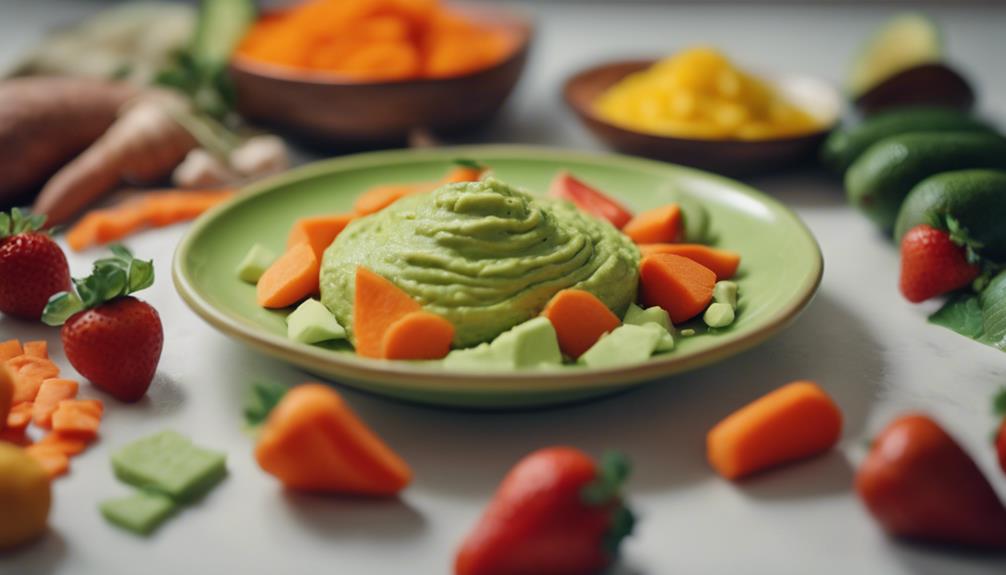For a pleasant and beneficial experience for your infant, exploring homemade baby food recipes allows you to have control over the quality of ingredients and introduces important nutrients. Starting with iron-rich foods for brain development, healthy fats for brain and eye health, and protein for muscle growth is essential. Vitamins A and C, as well as whole grains, provide antioxidants and fiber. As your baby grows, transition from soft to solid finger foods, starting with options like sweet potatoes. Some popular choices for homemade purees include sweet potato, butternut squash, and carrot. Ensure freshness by storing in airtight containers in the refrigerator or freezing for a longer shelf life.
Key Takeaways
- Homemade baby food recipes offer fresh, nutritious, and cost-effective meals.
- Introduce variety with popular choices like sweet potato, butternut squash, and carrot purees.
- Include iron-rich foods, healthy fats, proteins, vitamins, and whole grains for essential nutrients.
- Experiment with different textures and flavors to encourage exploration and healthy eating habits.
- Proper storage and safety practices ensure freshness and nutritional value for babies.
Benefits of Homemade Baby Food
Making your own baby food offers numerous benefits that can positively impact your child's nutrition and overall well-being. Homemade baby food allows you to have full control over the ingredients, ensuring freshness and quality in every puree you prepare.
By creating your own recipes, you can introduce a wider range of nutrients and textures to your baby's diet, catering to their specific needs and preferences. These homemade options aren't only healthier but also more cost-effective compared to store-bought varieties, offering a broader spectrum of flavors for your little one to explore.
Incorporating homemade baby food into your child's diet fosters healthy eating habits from a young age, setting a foundation for a lifetime of nutritious choices. Bonding with your baby over the preparation of these meals can be a rewarding experience, strengthening your relationship while promoting a positive attitude towards food and nutrition.
Essential Nutrients for Babies
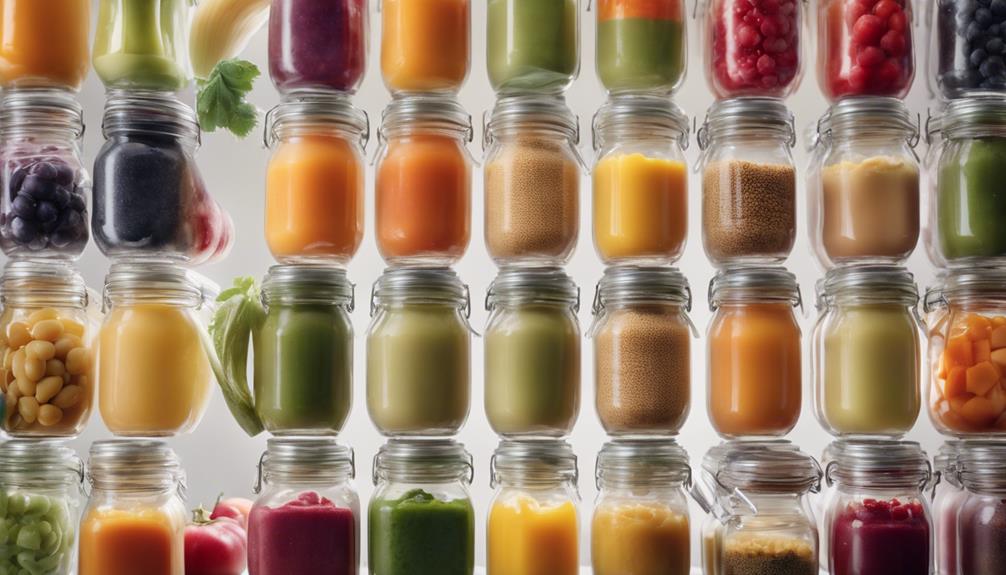
To support your baby's growth and development, ensuring they receive essential nutrients like iron, fat, protein, and vitamins is crucial. Iron-rich foods such as fortified cereals, meat, and beans are important for brain development and preventing anemia.
Healthy fats found in avocado, coconut oil, and fatty fish are essential for brain and eye development. Protein sources like chicken, beef, and legumes aid in muscle and tissue growth.
Vitamins A and C from fruits and vegetables provide antioxidants and overall health support. Including whole grains in baby food combinations can offer fiber and essential nutrients for your little one's development.
When preparing baby food recipes, focus on a balanced mix of these nutrients to make sure your baby receives the necessary building blocks for their growth. Remember, a diverse diet with a variety of nutrient-rich foods such as fruits, vegetables, and proteins is key to supporting your baby's health and well-being.
Introduction to Solid Foods
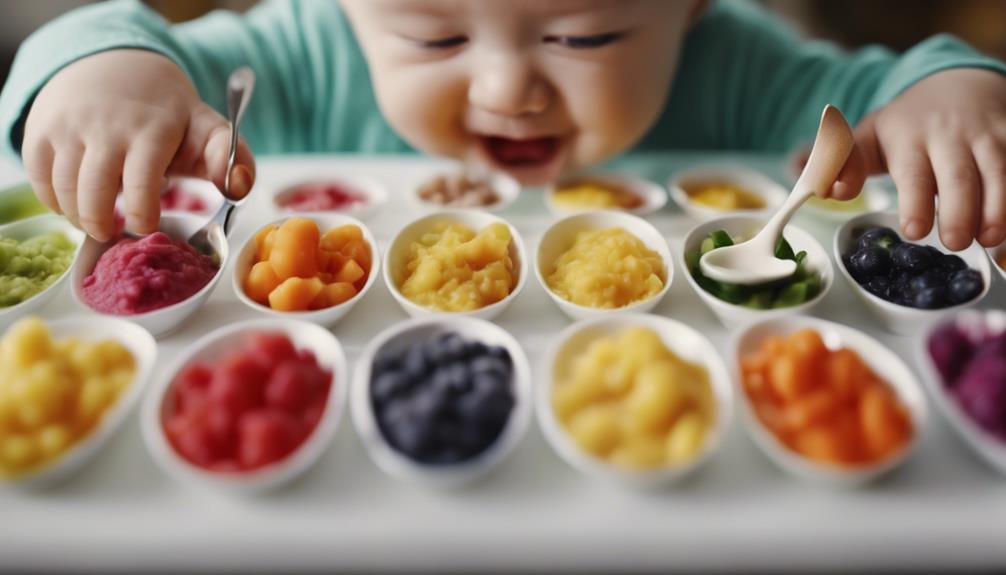
Solid foods for babies typically involve moving from soft or pureed options to more solid finger foods as they grow and develop.
Making homemade baby food can be a great way to guarantee your little one gets nutritious meals.
When introducing solid foods for the first time, it's important to start with easy-to-digest options like sweet potatoes or avocados. These foods aren't only easy to make but also packed with essential nutrients for your baby's growth.
Adding a variety of foods is key to providing a balanced diet that meets your baby's nutritional needs. Make sure the foods you offer are soft and cut into small, manageable pieces to prevent choking hazards.
It's best to introduce one new food at a time to monitor for any allergic reactions.
Homemade Baby Food Recipes
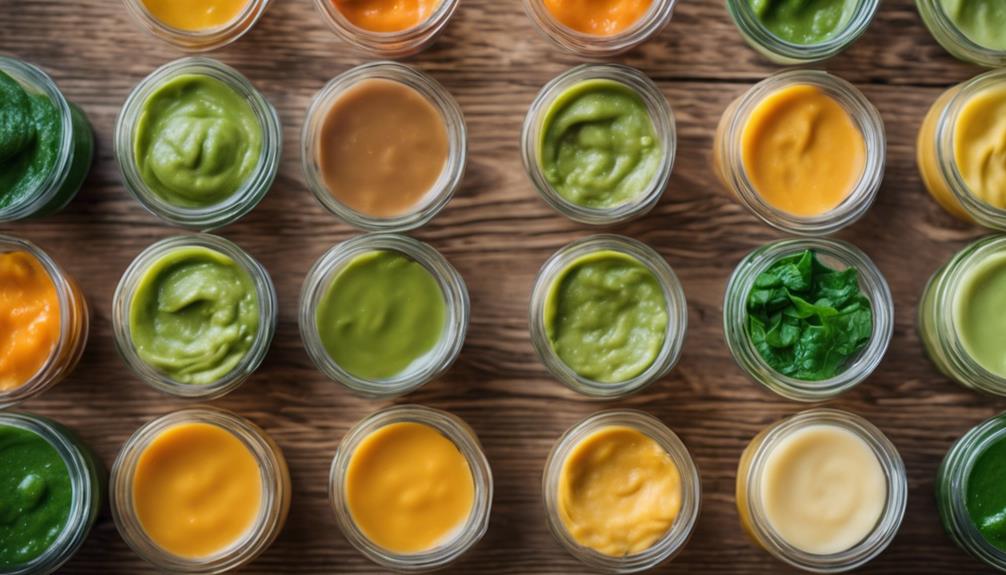
As you explore homemade baby food recipes, you open the door to a world of nutritious and customizable meal options for your little one. Making homemade baby food provides a cost-effective way to guarantee your baby receives fresh and wholesome meals.
Sweet Potato Baby, Butternut Squash Baby Food, and Carrot Baby Food puree are popular choices due to their nutritional value and mild flavors. You can also introduce Green Bean Baby and Baby Rice Cereal as first foods.
When you make homemade baby food, you have the flexibility to tailor the recipes to suit your baby's preferences and dietary requirements. Finger foods like Quinoa Baby and oatmeal recipes offer different textures to help with your baby's developmental milestones.
Storage and Safety Tips
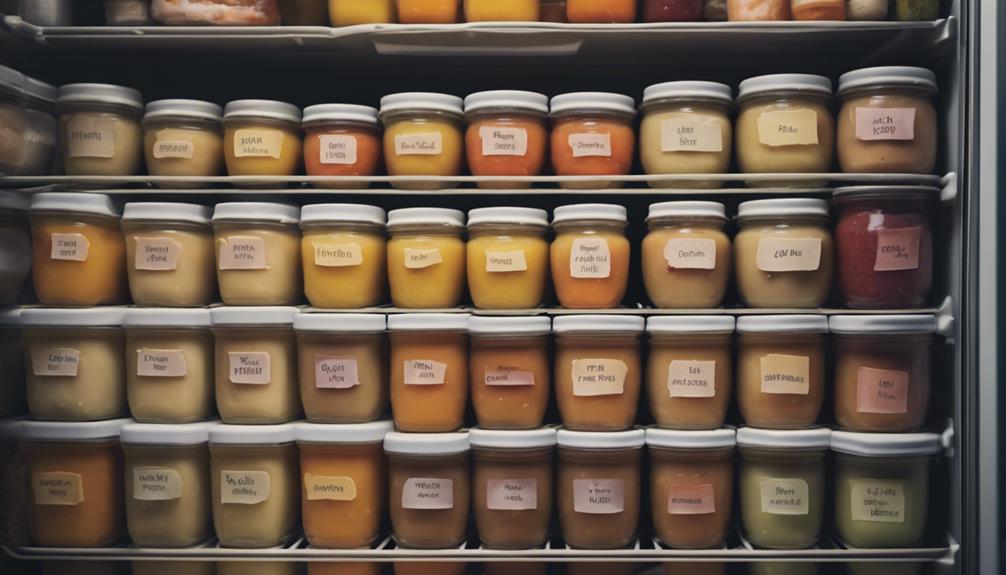
When it comes to storing baby food, it's vital to maintain safe practices and prevent any potential contamination. Properly sealing containers and promptly freezing baby food after preparation are key steps to uphold freshness and safety.
Safe Storage Practices
For best freshness and safety, store your baby food purees in airtight containers in the fridge for up to 4 days. Keeping the purees chilled helps to inhibit bacteria growth and maintain the integrity of the nutrients.
If you want to extend the shelf life of your baby food, consider freezing the purees in labeled containers for up to 4 months. Properly labeling the containers with the name and date of the puree will help you keep track of freshness and make sure you rotate them accordingly.
It's important to follow specific storage instructions provided in each baby food recipe to guarantee the best quality for your little one. Ensuring that containers are tightly sealed is vital in preventing bacteria growth and preserving the nutritional value of the baby food.
Preventing Food Contamination
To prevent food contamination and guarantee the safety of your baby's meals, proper storage and safety tips are essential.
When storing solid foods like sweet potatoes, make sure to store homemade baby foods in airtight containers in the fridge for a maximum of 4 days. For longer storage, freeze baby food in labeled containers using ice cube trays for up to 4 months.
Labeling the containers with the name and date of preparation is vital to track storage time and ensure food safety. When needed, thaw frozen baby food in the refrigerator or under warm water to prevent bacterial growth.
Promptly freezing leftover baby food is also important to avoid spoilage and ensure the safety of the food your little one consumes. By following these guidelines and best practices, you can maintain the freshness and nutritional value of your homemade baby food while safeguarding your baby's health.
Feeding Tips for Babies

Soft or pureed foods should be introduced to babies before progressing to solid finger foods to promote safe swallowing and facilitate a smooth transition to solid foods.
When feeding your baby, pay attention to their cues to understand when they're full or still hungry.
Starting solids with wholesome ingredients like baby oatmeal, fruits, and vegetables can provide essential nutrients for your baby's growth and development.
Consider incorporating easy baby feeding practices by offering them a variety of nutrient-dense foods from your plate as they sit in your lap.
While making your own puree recipes is an excellent way to control what your baby eats, using commercial baby food can be a convenient option for meals on the go.
Remember to introduce new foods gradually to monitor for any potential allergies or digestive issues.
Delaying certain foods like grains, refined sugar, and nuts until after your baby's first birthday is recommended to safeguard their well-being.
Delicious Baby Food Combinations
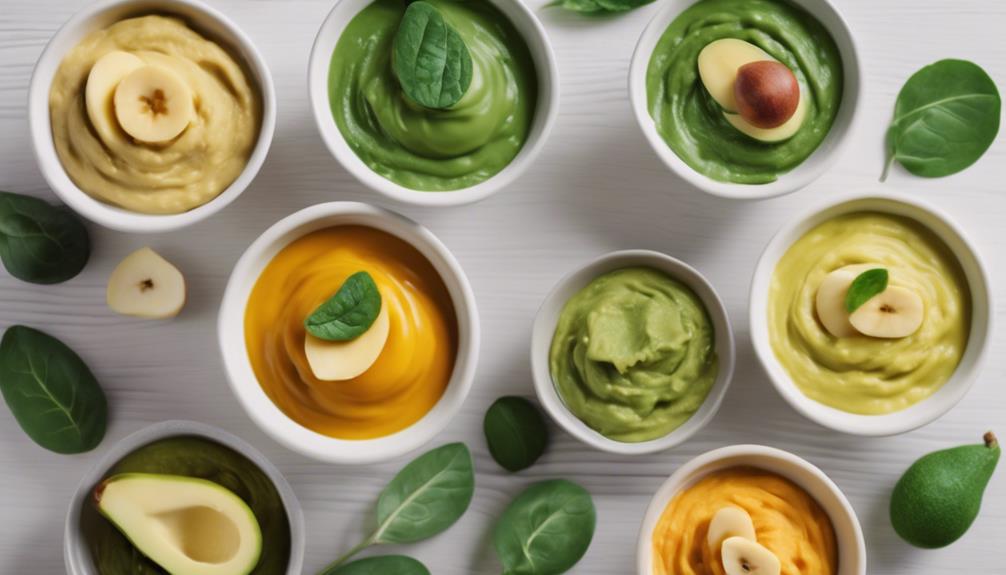
Introduce new flavors and essential nutrients to your baby's diet by mixing fruits like apples and pears in delicious baby food combinations. These flavor combinations not only appeal to your baby's taste buds but also provide a range of vitamins and minerals important for their development.
Incorporating vegetables such as sweet potatoes and carrots into your baby's meals offers a diverse array of essential nutrients, supporting their overall health. Adding grains like brown rice or oats to purees not only boosts the fiber content but also introduces different textures for your baby to explore, aiding in their sensory development.
Blending proteins like chicken or tofu with vegetables creates balanced meals packed with essential amino acids necessary for your baby's growth. Including healthy fats from sources like avocados or olive oil in baby food recipes contributes to brain development and enhances nutrient absorption, ensuring your baby receives a well-rounded diet rich in essential vitamins and nutrients.
Frequently Asked Questions
What Is the Healthiest Way to Make Baby Food?
The healthiest way to make baby food is by using fresh, organic ingredients and avoiding salt, sugar, or artificial additives. Steaming or roasting fruits and vegetables helps retain nutrients. Homemade baby food gives you control for a balanced diet.
What Is the #1 Most Important Food for Your Baby?
You know breast milk is the #1 most important food for your baby. It's packed with essential nutrients and antibodies that support growth and protect against infections. Best nutrition, brain development, and health – that's what it's all about.
What Are the Best Nutrient Rich Foods for Babies?
For your baby, focus on iron-rich foods like liver, egg yolk, and lean meats to prevent anemia. Nutrient-dense fruits and vegetables such as sweet potatoes and blueberries are important for development, while avocados and whole grains provide essential nutrients.
How to Make Good Tasting Baby Food?
To make good tasting baby food, enhance flavors with natural fruits, add mild spices for variety, roast veggies for sweetness, play with textures, and prioritize fresh, quality ingredients. Remember, avoiding added sugars and salt is key for creating delicious and nutritious meals.
What Can Be Mixed With Baby's Regular Meals to Make Them More Nutritious?
To make baby's meals more nutritious, mix in pureed fruits and vegetables for added vitamins, healthy fats like avocado for essential nutrients, protein sources like chicken for growth, and complex carbs for energy.
Conclusion
To sum up, homemade baby food provides a delicious and nutritious option for your little one. By incorporating essential nutrients and introducing a variety of flavors, you can guarantee your baby is getting the best start in their journey to solid foods.
With proper storage and safety measures in place, feeding your baby homemade meals can be a rewarding experience for both you and your child.
So, get creative in the kitchen and enjoy making wholesome meals for your little one!


